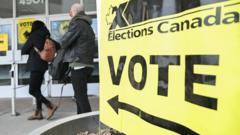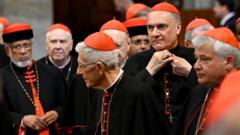In a historic election, Canadians are casting ballots today to determine their next prime minister amid growing concerns about the economy and foreign pressures. The two leading candidates, Prime Minister Mark Carney, newly appointed in March, and Conservative leader Pierre Poilievre, find their policies shaped by recent changes in public sentiment and international relations.
**Canada Faces Pivotal Leadership Choice Amid Economic Turmoil**

**Canada Faces Pivotal Leadership Choice Amid Economic Turmoil**
As Canadians head to the polls, the looming influence of President Trump's trade policies significantly alters the political landscape. Voters must choose between Prime Minister Mark Carney and Conservative leader Pierre Poilievre, both vying to navigate the nation through this crisis.
The Liberal Party, led by Carney, is trying to maintain an edge as opinion polls indicate a tight race against the Conservatives. The unexpected resignation of Justin Trudeau has shaken up traditional political dynamics, especially as Trump's trade policies begin to bite into the Canadian economy, causing much concern for voters. While previously, Poilievre enjoyed a strong lead, the political tide has shifted, with many citizens now preferring Carney’s experienced fiscal management during these uncertain times.
In the context of these challenges, Canadians are turning their attention to pressing issues such as skyrocketing housing costs, food prices, and tariff impacts on trade relations with the U.S. As election day unfolds, Canadians are aware that their votes will not only shape domestic policies but also influence their response to external forces like President Trump, who continues to assert claims of Canadian annexation.
Both candidates aim to alleviate public anxiety over living costs, offering tax breaks for first-time homebuyers and low-income families. Voters will be weighing not solely economic strategies, but also the candidates' visions for Canada's place on the world stage in relation to U.S. policy shifts. The outcome of this election is expected to reverberate beyond Canada’s borders, particularly considering the close economic ties and tensions inherent in U.S.-Canada relations.
Despite the unpredictability of the voter turnout and impact of external politics, all eyes are on Canada as polling stations close later today, with a compelling array of parliamentary seats at stake.
In the context of these challenges, Canadians are turning their attention to pressing issues such as skyrocketing housing costs, food prices, and tariff impacts on trade relations with the U.S. As election day unfolds, Canadians are aware that their votes will not only shape domestic policies but also influence their response to external forces like President Trump, who continues to assert claims of Canadian annexation.
Both candidates aim to alleviate public anxiety over living costs, offering tax breaks for first-time homebuyers and low-income families. Voters will be weighing not solely economic strategies, but also the candidates' visions for Canada's place on the world stage in relation to U.S. policy shifts. The outcome of this election is expected to reverberate beyond Canada’s borders, particularly considering the close economic ties and tensions inherent in U.S.-Canada relations.
Despite the unpredictability of the voter turnout and impact of external politics, all eyes are on Canada as polling stations close later today, with a compelling array of parliamentary seats at stake.






















